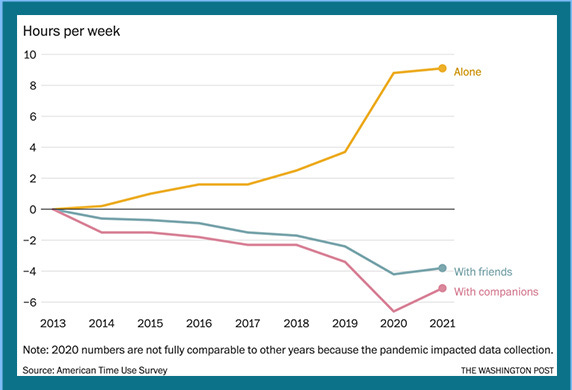Don’t even get me started on supposedly-adult men of voting age who are infatuated with My Little Pony (a.k.a. “Bronies”). Great Napoleon’s bleeding ulcers, it actually turns my stomach to read about these fucking losers.
At the risk of sounding all White Christian Male and stuff [irony alert], allow me to remind everyone of this excellent precept from Corinthians:
When I was a child, I spake as a child, I understood as a child, I thought as a child: but when I became a man, I put away childish things.
Except that men aren’t doing any of that. Instead, they’re clinging to the artifacts of their childhood, hoping that Mommy will be there to keep the Big Bad Wolf/Zombies away.
What will inevitably happen is calamity. As Charles Norman puts it: “The world is running out of grown-ups. It will probably take tragedies and a prolonged era of diminished affluence for people to grow up.”
Like I said: calamity.
Kim du Toit, “Kiddies”, Splendid Isolation, 2019-08-22.
December 15, 2023
QotD: Delayed onset adulthood
December 14, 2023
December 13, 2023
December 12, 2023
On Machiavelli
Rob Henderson dips into the works of Niccolo Macchiavelli, not so you don’t have to, but perhaps in hopes you’ll do so as well:
This is an overview of Niccolò Machiavelli — his backstory, his personal views, a summary of Machiavellian thought, and an explanation for why his ideas have been so despised throughout history.
Throughout his books, Machiavelli seems to take delight in demonstrating — much to his reader’s discomfort — the distance between our lofty intentions and the actual consequences of our deeds.
Writing in the sixteenth century, Machiavelli anticipated Nietzsche’s conception of master and slave morality by some three hundred years.
In Ch. 15 of The Prince he wrote:
Since it is my intent to write something useful to whoever understands it, it has appeared to me more fitting to go directly to the effectual truth of things than to the imagination of it … many have imagined republics and principalities that have never been seen or known to exist in truth … he who lets go of what is done for what should be done learns his ruin rather than his preservation.
This passage is often viewed as the essence of Machiavellianism. He had no intentions of disguising unpleasant realities. He wanted to describe the world as it is, and not as people wish it to be.
[…]
Machiavelli rejected the dominant utopian ideas of his day, including Platonic or Augustinian cities of God and the concept of Christian universalism (or its modern variant of Humanism).
Machiavelli warns rulers to be on guard against those who do not see men as they are, and see them through spectacles colored by their hopes and wishes, their loves and hatreds, in terms of an idealized image that they want men to be, and not as they are.
Some pieces of advice Machiavelli offers to rulers:
- Employ brutality or kindness, as the case requires. Brutality is usually more effective, but kindness, in some situations, bears more fruit
- It’s better to be feared than loved. Love is fickle, but fear is predictable. The worst is to be hated. Hatred will lead your subjects to destroy you
- It’s a good idea to keep your people in a state of poverty and always prepared for war. This helps to reduce both ambition and boredom — two qualities that can undermine obedience
- Fierce competition in a society is desirable, for it generates energy and ambition
- Religion must be promoted regardless of how truthful it is, because it supplies social solidarity
- When you confer benefits to the people, make sure to do so yourself. But let minions do the dirty work of inflicting punishments because then they, not you, will be blamed, and you can then gain the people’s favor by cutting off your minions’ heads
- Men prefer vengeance and security to liberty
- If you have to commit a crime, don’t advertise it beforehand. Otherwise your enemies may destroy you before you destroy them
- Punishment should be delivered in a swift and brutal manner, while rewards should be dispersed in small amounts over time
- Be wary of powerful advisors and servants — victorious generals should be purged after they have served their purpose, otherwise they may attempt to usurp you
- You can be violent and use your power to command obedience, but if you break your own laws you will undermine societal stability
- Men should either be caressed or annihilated; appeasement and neutralism always lead to ruin. Your adversaries can recover from minor injuries and setbacks to seek revenge. But if you crush them totally, you neutralize any threat.
- Rulers must live in the constant expectation of war
- Success inspires more devotion than friendliness and affability
- Men will lie to you unless you compel them to be truthful by creating circumstances in which deception will not pay
This list could continue but I’ll stop here.
December 5, 2023
Vanity does apparently have a limit (for most of us) – it’s about 25%
Rob Henderson explains why so many people — not down-to-earth sensible folks like my readers, of course — seem to have an inflated view of their own attractiveness:
A few years ago, a study on online dating found that people tend to reach up the hierarchy toward potential partners who are more desirable than themselves. On average, people pursued partners who are 25% more desirable than they themselves are.
This is consistent with what the psychologist Roy Baumeister has described as the “optimal margin of illusion”. Generally, people believe they themselves are 10-20% better than they really are.
Thus, people might not knowingly pursue individuals who are more desirable than themselves. Rather, they genuinely believe those individuals are in their league. They think they’re aiming for someone of equal attractiveness to themselves.
Consistent with this idea, a study looked at how people inflate their perceptions of themselves. The researchers brought people into their lab to have their photos taken. The researchers then digitally modified these images to varying degrees by making them look more similar to an attractive person or a less attractive person.
So imagine they take your photo (assuming you’re male) and change the image to look just a little bit more like Brad Pitt. Or a bit more like someone much uglier than you.
A few weeks later, the researchers invited the participants back into the lab and showed them either modified or unaltered photos of themselves.
People were asked to identify their true, unaltered photo among an array of images. One image was their actual photo. Others were morphed to be more or less attractive.
Participants were most likely to guess that their true photo was the one that was modified to be 10 to 20 percent more attractive.
This probably matches your own experience. Consider how you react to candid photos of other people compared to candid photos of yourself. We hear our friends say, “Ugh, that’s a horrible photo of me” and we think “No, that photo is fine, that’s what you look like.” But then we say the same thing when we see candid photos of ourselves. So unflattering.
In his book The Social Leap, the evolutionary psychologist William von Hippel has written, “That’s why you don’t like candid pictures of yourself: because they capture what you actually look like, not what you think you look like. You prefer the picture of yourself that caught you at just the right angle, on just the right day, and those are the ones you put up on Facebook, Tinder, or in the company directory.”
This pattern of self-enhancement extends beyond just physical attractiveness.
I’ve written before about the “better-than-average effect”. A large body of research has found that people tend to believe they are more intelligent, trustworthy, and have a better sense of humor than others. A recent study found that people believe they use ChatGPT more critically, ethically and efficiently than others. People think they are better drivers than average, students think they are better students than average, professors think they are better professors than average.
People do inflate their opinions of themselves. But this only goes so far. People in the photo study chose images that were slightly more attractive than the true photo, but only slightly.
Most people see themselves as just a bit better than they really are.
“Why should a criminal act be punished more or less severely depending on a victim’s ability to emote in public about it?”
Janice Fiamengo with a column that, had it been written by a man, would merit universal condemnation from the mainstream media (instead, if they pay any attention to it will probably dismiss it with hints of “false consciousness” or “Stockholm syndrome”):
For years, activists told us that part of the horror for sexual assault survivors was the fear of not being believed, the feeling that one was alone with an experience no one else understood or even acknowledged. Fair enough. Now, decades into the near-constant discussion of all varieties of such assault, many quite trivial yet treated with great seriousness, women don’t seem to have become any better at dealing with the ostensible horror — quite the opposite. The unending focus on sexual victimization seems only to have created more victims.
A case in point involves the infamous sexual crimes of Dr. Vincent Nadon, a now-disgraced GP at the University of Ottawa Health Clinic, who in late 2018 was sentenced to eight years in prison after he pled guilty to many dozens of counts of voyeurism and sexual assault during a 28-year medical practice. (The exact number of charges was hard to determine, seeming to change in every report). Much of what Nadon pled guilty to — mainly the recording of women via his cellphone while they were undressing or undergoing breast exams — was a type of deeply unprofessional conduct that might have gone forever unnoticed by the victims if one intrepid woman had not seen the cellphone’s recording light winking at her from a cabinet and gone to investigate. There were also allegations of sexual assault nearly indistinguishable in their details from regular medical touching — the main distinction being that the touching was “for sexual purposes”. Witnesses at Nadon’s sentencing hearing spoke of what had occurred, in some cases many years previously, as if it had been the worst possible betrayal.
A report of the sentencing hearing described women wiping away tears as they told of “feelings of powerlessness, embarrassment and even guilt”. Others said they had become distrustful of men after learning of Nadon’s actions. One woman, having been shown by police a cellphone recording made of her in Nadon’s office, claimed that she felt physically ill and “has not been able to go to another doctor, and is uncomfortable undressing, even in front of her husband”. Another woman said she felt “violated and betrayed”, and now “looks for hidden cameras everywhere, is obsessed with locking doors, and has developed a medical condition that can be caused by stress”. Many alleged that they feared seeing videos of themselves on the internet though there is no indication Nadon ever uploaded any of his recordings.
In a separate report about fallout from the charges against Nadon, some women expressed outrage at authorities they saw as complicit in their victimization, with one woman complaining that University of Ottawa Health Services failed to “help [her] tell [her] story and come forward”. This woman, who told how she had not been provided with a gown to wear during a pap smear procedure with Nadon, was also furious at the University of Ottawa for failing to more closely monitor its health service provider. Her anger was sustained and wide-ranging: “Obviously I’m super traumatized. I feel extremely violated and so sick to my stomach. It’s really, really disgusting.” “It’s even hard for me now to find a therapist I can trust.”
I can’t get inside these women’s heads, of course, but their statements seem hysterical and irrational, far in excess of the facts, and perhaps willfully exaggerated in order to garner the maximum of attention and sympathy. It was disturbing to see such statements presented as if they proved something about the severity of Dr. Nadon’s actions. They prove nothing except the climate of alleged female sexual fragility in which we are all now forced to live.
Victim impact statements are often of dubious value in criminal justice proceedings — why should a criminal act be punished more or less severely depending on a victim’s ability to emote in public about it? — but in a case like this, with damsel-in-distress melodrama having already been stoked by multiple media reports at every stage of the investigation, the victim statements took on a particularly staged, formulaic quality. One had to make an effort to remember that many of the complainants would not even have known they were harmed if police hadn’t shown them that they were. Their pain may have been real, but it was also almost entirely self-generated.
The whole story of Dr. Nadon the beloved physician turned super-predator seems to have been largely manufactured, first and foremost by police, who were so eager to find as many complainants as possible that they repeatedly put out calls through the media for more “victims” to come forward. I’ve never seen anything quite like it, with police stating publicly that they feared there were likely more victims, and issuing “a public plea for help”. What did they expect to happen?
December 1, 2023
“I considered shopping a proposal for an anti-helicopter parenting book called Your Kid Sucks, but for some strange reason my agent dissuaded me”
Freddie deBoer on the modern phenomenon of “helicopter parenting”:

Collapse in childhood freedom – Graphic showing the diminishing “free ranges” of each generation of an English family.
For the New York Times, Jessica Grose details how new online grading systems allow parents to track the progress of their children not from year to year, semester to semester, report card to report card, but week to week or even day by day. The results are depressingly predictable, in today’s parenting environment. There’s stress for students and teachers alike, a collapse in interest in learning in and of itself, an adversarial relationship between parents and teachers, and the rise of “hyperchecking”, where parents complain about each and every single grade that isn’t an A. The piece is about K-12, but Grose notes that parents are increasingly seeking access to college online gradebooks, which seems crazy to me; as someone who’s taught a lot of college classes, the idea of someone constantly monitoring a student’s grade with the mindset of a litigious lawyer sounds awful. But then again, perhaps I shouldn’t be surprised. Here’s a piece about helicopter parenting extending into the college years to the extent that the parents are arranging social calendars. Of their college-age children.
I’ve been thinking about these issues for some time — I considered shopping a proposal for an anti-helicopter parenting book called Your Kid Sucks, but for some strange reason my agent dissuaded me — and what I can’t stop wondering is why parents don’t stop doing this stuff for the good of their kids themselves. There are social and philosophical critiques to be made of helicopter parenting, some very good ones. But we never need to wonder why people choose to pursue selfish interests over social or philosophical ones. What consistently surprises me is that parents keep puttering along in the clouds above their kids, binoculars in hand, when there seem to be really compelling arguments against doing that for reasons that are completely aligned with the selfish interests of the kids. I get ignoring social responsibility for the sake of your kid; it’s hard to understand ignoring what’s best for your kid for the sake of your kid.
There’s the social case to be made against helicopter parenting, of course. If you wanted to define the essential moral project of human beings in the broadest terms possible, you could do worse than “put others before self”. Aggressive parenting allows people to juke this basic logic — parents who act as though their child’s best interest is the only important criterion are, in a literal sense, putting someone else before themselves. “Hey, I may be disadvantaging already-disadvantaged kids with my hyperactive parenting, but I’m doing it for a greater cause than myself.” And the intrinsic (genetic) dedication to the good of one’s child obliterates the broader social concerns once freed from the guilt of traditional for-myself selfishness. But hyper-parenting still reflects selfishness, putting your own kin above the interest of everyone else, especially in cases where the harm done to society is a lot bigger than the benefit to your child. Academic malfeasance like the Varsity Blues scandal has obvious negative social consequences, for example, while those specific kids faced only going to slightly less competitive or desirable schools had there been no fraud in their applications. Less directly illicit behavior, like grade grubbing — which, among other things, inevitably benefits the students with the parents who are the most aggressive and who hold the most social capital — are a greyer area, but ultimately do more to unbalance an already-unbalanced system. If these parents were confronted with the opportunity to do this for themselves, I genuinely think that most of them would decline, out of a sense of social obligation. But once it’s “for my kid”, it’s no holds barred.
I think absolutely all parenting contains a little narcissism, and that’s OK; it’s probably a part of our genetic endowment that helps compel parents to nurture their children, and anyway parenting is a tough job that we shouldn’t expect people to perform with no sense of self-satisfaction. But it is one of those quirks of our social order that the parents who are the most politically progressive, who most ardently advocate for a society that serves all of our people, are often also the most unapologetic about putting their thumb on the scale for their own children. Plus, the sort of second-order selfishness of parenting allows for the sidestepping of more philosophical objections to helicopter parenting. These objections are less about the social good of others and more about the content of our individual characters. These include personal values such as the notion that we just should, as human beings, be able to live with a degree of independence in youth; that we just should experience hardship and the consequences of our actions to better appreciate what it means to be alive; that we just should, as human beings, secure our own interests to whatever degree we’re able, without help from above, including in school; that we just should operate as though we are but one in a broad collection of human beings, all of whom matter as much as we do, for our own spiritual good. The thing about these personal values is that they’re only motivating if they are indeed personal — that is, these might sway an individual, but not even occur to their parents, and in our system parents have remarkable ability to obstruct the agency of their kids. They can do the dirty work the kids might not do for themselves.
November 27, 2023
QotD: The PUA (Pick-up Artist)
… the women the PUAs are after aren’t the kind that interest me, much of “game” as described in the PUA culture fills me with a mix of recognition and revulsion. And a third, more complex reaction that is the real reason I’m writing this essay.
One one hand, I recognize techniques like kino escalation. Oh, do I ever! Adroit use of that one has gotten me into the sack more times than I can count. On the other hand, I’m basically incapable of what PUAs call the neg; I can’t insult a woman even by implication unless I think she’s done something to specifically deserve it, and the thought of flinging negs to score sex disgusts me in a very fundamental way.
On the gripping hand … I recognize a harsh truthfulness in a lot of what the PUAs are saying. Crudely put, the “game” advice for most men (the population PUAs call AFCs or “Average Frustrated Chumps”) reduces to behaving like an asshole so women will mistake you for an alpha. I really am an alpha, so I don’t have to asshole-fake it — but it is nevertheless quite clear to me that the PUAs are on to something. This is frequently a successful strategy; I’ve been outcompeted by it myself on several humiliating occasions. Furthermore, the PUAs are probably correct in asserting that for many AFCs it is the best strategy available, and never mind that the thought of running it myself turns my stomach.
In the PUA’s disturbingly persuasive analysis, I’ve had the luxury of not treating women like shit only because I have often had USPs for the brighter-than-average women I was interested in, notably in the combination of alpha-male qualities with high intelligence and expressive skills. Without those USPs, argues the PUA, my choices would have reduced to “frustrated loser” or “sexually successful douchebag” — and, looking at my own experience and that of my less successful peers, I find myself unable to refute this.
That is kind of horrifying if you think about it. Possession of USPs is rare by definition, and if you have one you’re more than averagely likely to be an alpha anyway. The PUA is telling us that human beings are designed in such a way that the most reliable way for the large majority of beta males to get sex is to behave like narcissistic, dominating, emotionally-unavailable jerks. This would be appalling enough as pure theory, but the PUA makes it worse by applying it to actually have lots of sex. “Success” one blog unsparingly observes “is defined by penis in vagina”. Never take your eye off that ball, says the PUA. Much as one might like to dismiss this as crass reductionism, evolutionary theory makes any countercase rather difficult to argue.
How did our poor species get into this hole? The PUA community gravitates to evolutionary-psychology explanations for human behavior as much as I do, it’s one of the interesting things about reading their stuff. It’s remarkable how often they manage to apply facts about human reproductive biology in a tactical way. The use they make of evo-bio concepts like hypergamy, peacocking, and sexy-son theory is, I find, sound and justified. The kind of pitiless clinical eye they turn on human mating interactions could scarcely be bettered by most scientists.
But the PUAs don’t, at least so far as I’ve yet seen, have a generative explanation for why women friend-zone nice guys and fuck bad boys. They accept this as the foundation of game without asking what circumstances in the environment of evolutionary adaptedness stuck women with apparently counterproductive wiring.
I’ve thought about this, and the only plausible explanation I can come up with is that in the EEA, when early humans lived in small hunting bands, the behaviors modern assholes now use to fake alpha must have been reliable indicators of superior status. Perhaps they were much more risky to fake in a small society where beta males were almost constantly under they eye of senior alphas with hard fists.
Meanwhile, back in modernity, we’re stuck with the consequences – men who have been trained to be imitation-alpha jerks and abusers by women who are sexually fickle, manipulative and cruel towards beta males. It’s not a pretty picture, not if you’re looking in from halfway outside it like me and certainly not if you’re stuck in the middle of it as an invisible AFC or a woman wondering why she’s surrounded by douchebags.
Eric S. Raymond, “A natural contemplates game”, Armed and Dangerous, 2011-03-03.
November 23, 2023
November 21, 2023
“Self-checkouts are not quite Skynet T-800 death dealers. Sarah Connor can rest easy – for now”
I realize the problem is me, in that I hate self-checkout kiosks with a fiery passion and have been known to abandon any plans to purchase from a store if there is no human assigned to the checkout desk. I decline (with thanks) all offers to use the self-checkout — several of which are often unused — while lined up three or four deep at the one human’s work station. It must be my Luddite side showing. But, as Christopher Gage shows here, I’m not completely alone:

Self-checkout using NCR Fastlane machines at a Sainsbury’s store in the UK.
Photo by Magnus Manske via Wikimedia Commons.
“He’s got a problem with potatoes,” said the condemned, guarding the self-checkout machines. Potatoes plague them. Carrier bags flummox them. ‘Surprising item on the scale,’ it squeaked as if I were weighing up a kilo of black-tar heroin.
The retirement refusenik tapped a code on the screen for the third occasion before returning to his post. ‘Unexpected item in the bagging area.’ Embarrassed, I marshalled my friend — the Hobbity, amenable man with the silver slugs for eyebrows — for the fourth time. He recanted a well-worn sop dispensed to young dotards like me: “Don’t take it personally,” he said. “He just doesn’t like you.”
Self-checkouts are not quite Skynet T-800 death dealers. Sarah Connor can rest easy — for now.
After a little while, the machine let me go. The ordeal, fractious and infinitely slower than employing the helpful man to man a till, was over. Then, the devil-device sucker-punched square in the testes.
“Lovely to see you bye for now,” read the screen. Sinister, like a Jehovah’s Witness grinning. No comma after the introductory clause?! The insolent swine. I fought the primal urge to drown the machine in Coca-Cola and watch it crackle. The clean-up would be Harold’s job. He had enough on his plate.
Mercifully, one supermarket has sacked these silly machines.
Booths, a posh retailer up north, has retired self-checkouts in all but two of their stores. The good burghers of Booths reckon humans talking to other humans is a groundbreaking idea that will catch on in future.
“We have based this not only on what we feel is the right thing to do but also from having received feedback from our customers,” they said.
“Delighting customers with our warm northern welcome is part of our DNA.”
Wearily, Booths did what British northerners must do lest they spontaneously combust — they peacocked their northernness. Apparently, to be born on a particular patch of this floating rock bestows northerners an umbilical, friendly mien.
Northerners cannot help themselves. POV: You encounter a northerner in a pub: “A malignant tumour, you say? You wanna get yourself a northern tumour. Northern tumours are far less aggressive than those bloody southern tumours. It’s a fact! Northern tumours still have a sense of community, you see. Not like southern tumours …”
I must forgive them. Booth’s “northern welcome” is a good thing. Entities imbued with DNA are a good thing. Even one fewer self-service checkout is a good thing.
From where Booth’s tread, others may follow. The numbers don’t tell fibs.
Self-checkouts mutate even the most cherubic of citizens into a degenerate thief. Stores with self-service checkouts suffer double the shrinkage (4%) — industry-speak for pilfering and thieving.
Researchers say the temptation can prove too much, provoking our inner tea leaf into a spot of half-inching. Self-checkouts goad miscreants into slapping a “Reduced to £1” sticker on a litre of Jameson.
Booths have bucked a trend. A fatuous, anti-human trend.
Update: Fixed broken URL.
November 20, 2023
“[W]hen low status people express the truth, it sometimes becomes high status to lie”
Rob Henderson explains some of the reasons smart people can believe dumb ideas:
Many have discovered an argument hack. They don’t need to argue that something is false. They just need to show that it’s associated with low status. The converse is also true: You don’t need to argue that something is true. You just need to show that it’s associated with high status. And when low status people express the truth, it sometimes becomes high status to lie.
In the 1980s, the psychologists Richard E. Petty and John T. Cacioppo developed the “Elaboration Likelihood Model” to describe how persuasion works. “Elaboration” here means the extent to which a person carefully thinks about the information. When people’s motivation and ability to engage in careful thinking is present, the “elaboration likelihood” is high. This means people are likely to pay attention to the relevant information and draw conclusions based on the merits of the arguments or the message. When elaboration likelihood is high, a person is willing to expend their cognitive resources to update their views.
Two paths to persuasion
The idea is that there are two paths, or two “routes”, to persuading others. The first type, termed the “central” route, comes from careful and thoughtful consideration of the messages we hear. When the central route is engaged, we actively evaluate the information presented, and try to discern whether or not it’s true.
When the “peripheral” route is engaged, we pay more attention to cues apart from the actual information or content or the message. For example, we might evaluate someone’s argument based on how attractive they are or where they were educated, without considering the actual merits of their message.
When we accept a message through the peripheral route, we tend to be more passive than when we accept a message through the central route. Unfortunately, the peripheral route is more prevalent because we are exposed to an increasingly large amount of information.
The renowned psychologists Susan Fiske and Shelley Taylor have characterized humans as “cognitive misers”. They write, “People are limited in their capacity to process information, so they take shortcuts whenever they can”.
We are lazy creatures who try to expend as little mental energy as possible.
And people are typically less motivated to scrutinize a message if the source is considered to be an expert. We interpret the message through the peripheral route.
This is one reason why media outlets often appoint experts who mirror their political values. These experts lend credibility to the views the outlet espouses. Interestingly, though, expertise appears to influence persuasion only if the individual is identified as an expert before they communicate their message. Research has found that when a person is told the source is an expert after listening to the message, this new information does not increase the person’s likelihood of believing the message.
It works the other way, too. If a person is told that a source is not an expert before the message, the person tends to be more skeptical of the message. If told the source is not an expert after the message, this has no effect on a person’s likelihood of believing the message.
This suggests that knowing a source is an expert reduces our motivation to engage in central processing. We let our guards down.
As motivation and/or ability to process arguments is decreased, peripheral cues become more important for persuasion. Which might not bode well.
However, when we update our beliefs by weighing the actual merits of an argument (central route), our updated beliefs tend to endure and are more robust against counter-persuasion, compared to when we update our beliefs through peripheral processing. If we come to believe something through careful and thoughtful consideration, that belief is more resilient to change.
This means we can be more easily manipulated through the peripheral route. If we are convinced of something via the peripheral route, a manipulator will be more successful at using the peripheral route once again to alter our initial belief.
November 19, 2023
Ted Gioia wonders if we need a “new Romanticism”
He raised the question earlier this year, and it’s sticking with him to the point he’s gathering notes on the original Romantic movement and what it was reacting against:
I realized that, the more I looked at what happened circa 1800, the more it reminded me of our current malaise.
- Rationalist and algorithmic models were dominating every sphere of life at that midpoint in the Industrial Revolution — and people started resisting the forces of progress.
- Companies grew more powerful, promising productivity and prosperity. But Blake called them “dark Satanic mills” and Luddites started burning down factories — a drastic and futile step, almost the equivalent of throwing away your smartphone.
- Even as science and technology produced amazing results, dysfunctional behaviors sprang up everywhere. The pathbreaking literary works from the late 1700s reveal the dark side of the pervasive techno-optimism — Goethe’s novel about Werther’s suicide [Wiki], the Marquis de Sade’s nasty stories [Wiki], and all those gloomy Gothic novels [Wiki]. What happened to the Enlightenment?
- As the new century dawned, the creative class (as we would call it today) increasingly attacked rationalist currents that had somehow morphed into violent, intrusive forces in their lives — an 180 degree shift in the culture. For Blake and others, the name Newton became a term of abuse.
- Artists, especially poets and musicians, took the lead in this revolt. They celebrated human feeling and emotional attachments — embracing them as more trustworthy, more flexible, more desirable than technology, profits, and cold calculation.
That’s the world, circa 1800.
The new paradigm shocked Europe when it started to spread. Cultural elites had just assumed that science and reason would control everything in the future. But that wasn’t how it played out.
Resemblances with the current moment are not hard to see.
“Imagine a growing sense that algorithmic and mechanistic thinking has become too oppressive. Imagine if people started resisting technology. Imagine a revolt against STEM’s dominance. Imagine people deciding that the good life starts with NOT learning how to code.”
These considerations led me, about nine months ago, to conduct a deep dive into the history of the Romanticist movement. I wanted to see what the historical evidence told me.
I’ve devoted hours every day to this — reading stacks of books, both primary and secondary sources, on the subject. I’ve supplemented it with a music listening program and a study of visual art from the era.
What’s my goal? I’m still not entirely sure.
November 18, 2023
“René Girard’s famous book I See Satan Fall Like Lightning isn’t directly about Barack Obama being the Antichrist”
At Astral Codex Ten, Scott Alexander reviews I See Satan Fall Like Lightning by René Girard:
The phrase “I see Satan fall like lightning” comes from Luke 10:18. I’d previously encountered it on insane right-wing conspiracy theory websites. You can rephrase it as “I see Satan descend to earth in the form of lightning”. But “lightning” in Hebrew is barak. So the Bible says Satan will descend to Earth in the form of Barak. Seems like a relevant Bible verse for insane right-wing conspiracy theorists!
Philosopher / theologian Rene Girard’s famous book I See Satan Fall Like Lightning isn’t directly about Barack Obama being the Antichrist. It’s an ambitious theory-of-everything for anthropology, mythography, and the Judeo-Christian religion. After solving all of those venerable fields, it will, sort of, loop back to Barack Obama being the Antichrist. But it’ll do it in such an intellectual and polymathic Continental philosophy way that can’t even get mad.
Girard’s starting point is the similarity between Bible stories and pagan myths. You’ve heard about this before — dying-and-resurrecting gods, that sort of thing. You might expect Girard, a good Catholic, to reject these similarities. He doesn’t. He says they’re real and important. Pagan myths resemble the Bible because they’re both describing the same psychosocial process. The myths are distorted propaganda supporting the process, and the Bible is a clear-eyed description of the process which reveals it to be evil. Just as worshipful Soviet hagiographies of Stalin and sober historical analyses of Stalin will have many similarities (since they’re both describing Stalin), so there will be unavoidable resonances between myth and the Bible.
Girard calls this process “the single-victim process” or “Satan”. It goes like this:
- Most (all?) human desire is mimetic, ie based on copying other people’s desires. The Bible warns against coveting your neighbor’s stuff, because it knows people’s natural tendencies run that direction. It’s not that your neighbor has particularly good stuff. It’s that you want it because it’s your neighbor’s. Think of two children playing in a room full of toys. One child picks up Toy #368 and starts playing with it. Then the other child tries to take it, ignoring all the hundreds of other toys available. It’s valuable because someone else wants it.
- As with the two children, conflict is inevitable. As the mimetic process intensifies, everyone goes from complicated individuals with individual wants, to copies of their neighbors (ie their desires copy their neighbors’ desires, and they become the sort of people who would have those desires). Alliances form and dissipate. There is a war of all against all. The social fabric starts to collapse.
- Instead of letting the social fabric collapse, everyone suddenly turns their ire on one person, the victim. Maybe this person is a foreigner, or a contrarian, or just ugly. The transition from individuals to a mob reaches a crescendo. The mob, with one will, murders the victim (or maybe just exiles them).
- Then everything is kind of okay! The murder relieves the built-up tension. People feel like they can have their own desires again, and stop coveting their neighbors’ stuff quite so hard, at least for a while. Society does not collapse. If there was no civilization before, maybe people take advantage of this period of relative peace to found civilization.
- (Optional step 5) Seems pretty impressive that killing one victim could cause all this peace and civilization! The former mob declares their victim to be a god. Killing the god was the necessary prerequisite to civilization. Now the god probably reigns in heaven or something. Maybe they die and resurrect every year. Whatever.
- Rinse and repeat.
Girard is against this process. Not just because it involves violent mobs lynching innocent people (although it does), but because that step perpetuates the whole cycle: people greedily desiring whatever their neighbors have, people hating their neighbors, internecine war of all against all. He dubs the process Satan, based partly on the original Hebrew meaning of Satan as “prosecutor”. Satan is the force that tells people that the victim is guilty and deserves to be lynched.
(and did you know that Paraclete, the Greek word for the Holy Spirit, originally meant “defense attorney”? The Paraclete is the force that — no, we’ll get to that later).
Are all myths and Bible stories really about this process? Girard says yes. For example, consider the myth of Oedipus. Around the end, Thebes is stricken by plague (Girard says plagues should usually be interpreted metaphorically as social plagues, ie discord). Everyone goes to the oracle and asks for a solution. The oracle says that someone has killed his father and married his mother, and the plague won’t end until that person is removed. It is revealed that Oedipus is the culprit. The mob expels Oedipus from the city, and the plague ends.
Okay, that’s one myth. Are there others?













